
The Powerful Benefits of Yoga for Kids: Boost Your Child’s Development
Learn about the powerful benefits of yoga for kids and how it enhances child development and can continue to support them as they grow.. A must-read for all parents! This post was created by Marra Robert, OTD, OTRL in August, 2023 and contains affiliate links.

Although yoga is one of the oldest spiritual practices in the world, it has been gaining more popularity in Western culture. As more people in the West become aware of all of the powerful benefits of yoga practice, more is being discovered about how beneficial yoga can be for children, especially those with developmental challenges or sensory processing needs.
Hi! My name is Marra and I am a mom and a pediatric occupational therapist. I’ve spent years working with children with a range of developmental needs and supporting their families as they navigate the ups and downs of child development.
As soon as I learned about the amazing benefits of yoga for kids and supporting child development, I started incorporating it into my practice with the children I worked with. The power of yoga reached far beyond just strength and endurance.
As I saw these benefits of yoga for kids through my OT practice, I was driven to dive deeper into this and I completed Level 1 Training in Asanas for Autism and Special Needs, a course that focused on the benefits yoga can have on child development. I’d like to share some of these benefits with you.
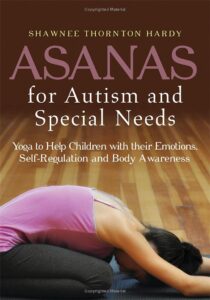
BENEFITS OF YOGA FOR KIDS: IMPROVED FOCUS AND CONCENTRATION
One of the surprising benefits that yoga brings to children’s development is improved focus and concentration. In today’s fast-paced world filled with distractions, helping children develop their ability to concentrate is essential for their academic success and overall well-being. Yoga provides a unique and effective approach to enhancing focus by combining physical movement with mindfulness techniques.
When children engage in yoga poses, they learn to pay attention to their bodies and the sensations they experience. Yoga forces them to slow their bodies down. This heightened body awareness cultivates the ability to be present in the moment and stay focused on the task at hand. As they hold poses and move through sequences, children are encouraged to stay focused on their breath, balance, and alignment. This mindful attention to their bodies and movements helps to train their minds to concentrate.
As I learned more about the amazing benefits of yoga for kids, I began incorporating more breathing exercises and games into my therapy sessions, which further enhance children’s ability to focus.
By learning deep breathing techniques and practicing meditation, children develop the capacity to calm their minds and tune out distractions. These mindfulness exercises teach them to direct their attention inward, promoting a sense of centeredness and clarity. As a result, children become better equipped to concentrate in school and other areas of their lives.
By incorporating yoga into their daily routines, parents and therapists can provide children with a powerful tool for enhancing their focus and concentration. The skills acquired on the yoga mat can transfer to various aspects of their lives, enabling them to excel academically, stay engaged in tasks, and navigate the challenges of the modern world with greater ease.
Furthermore, yoga helps children develop self-regulation skills, which are essential for optimal cognitive functioning. Through the practice of deep breathing and relaxation techniques, children learn to manage their emotions and reduce stress. This ability to regulate their emotions allows them to approach academic tasks with a calm and focused mindset, improving their overall cognitive performance.
In addition to improving focus and self-regulation, yoga also supports creativity and problem-solving abilities in children. The practice encourages them to think outside the box and explore different perspectives. Yoga’s emphasis on mindfulness and introspection fosters a sense of curiosity, enabling children to approach challenges with open-mindedness and innovative thinking.
The cognitive benefits of yoga extend beyond the classroom as well. By enhancing their cognitive skills through yoga, children are better equipped to handle the demands of the modern world. They develop the mental resilience and adaptability necessary to navigate a fast-paced and ever-changing society.

BENEFITS OF YOGA FOR KIDS: dEVELOPING bODY aWARENESS
Many of the children I work with have decreased body awareness or difficulty knowing where their body is in space in relation to other people and objects in their environment. Yoga does wonders for this!
Yoga encourages children to pause, tune in, and listen to their bodies. As they engage in various poses, they become more attuned to the subtle sensations and signals their bodies send them. They learn to differentiate between discomfort and pain, and to respect their limits while also challenging themselves to grow stronger and more flexible.
Through yoga, children develop a greater appreciation for their bodies and what they are capable of achieving. They learn to trust their instincts and listen to their bodies’ cues, fostering a healthier relationship with their physical selves. This newfound body awareness extends beyond the yoga mat and into their everyday lives, empowering them to make choices that support their overall well-being.
Not only does yoga help children understand their bodies, but it also promotes positive body image and self-acceptance. In a society that often places unrealistic expectations and pressures on appearance, yoga provides a safe space for children to embrace their bodies just as they are. They can learn to love their bodies! By encouraging self-compassion and self-love, yoga cultivates a positive self-image and boosts self-esteem.
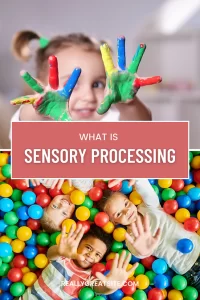
BENEFITS OF YOGA FOR KIDS: bOOSTING SELF-ESTEEM AND CONFIDENCE
Most children struggle with their self-esteem and confidence at some point or another. This is especially true for children with developmental challenges or sensory needs. Boosting a child’s self confidence will increase their ability to believe in themselves and try new things.
In addition to its physical benefits, yoga has the power to positively impact children’s mental and emotional well-being. By providing a nurturing environment that promotes self-acceptance and self-compassion, yoga boosts self-esteem and confidence in children. This newfound self-assurance plays a crucial role in equipping them to face life’s challenges with resilience and grace.
While society often places unrealistic expectations and pressures on appearance, yoga offers children a safe space to embrace their bodies as they are. By understanding and appreciating their physical capabilities, children develop a positive body image and a sense of self-acceptance. Through yoga, they learn to be compassionate towards themselves and cultivate self-love, fostering a healthy self-image that boosts their self-esteem.
Furthermore, the practice of yoga goes beyond physical movements and teaches children valuable lessons about the power of their minds. As they delve deeper into their practice, children develop mental strength and focus. They learn to connect their breath with movement and explore the depths of their own thoughts and emotions. This introspection and self-awareness contribute to a stronger sense of self and increased confidence.
By incorporating yoga into their lives, children acquire the tools to regulate their emotions effectively. They learn to navigate stress, anxiety, and other challenging emotions with poise and grace. This emotional regulation not only enhances their overall well-being but also builds their confidence in their ability to handle difficult situations. With each yoga practice, children develop the resilience to face life’s ups and downs, knowing they have the internal strength to overcome obstacles.

bENEFITS OF YOGA FOR KIDS: pROMOTING EMOTIONAL-REGULATION
By incorporating yoga into their lives, children acquire the tools to regulate their emotions effectively. This is so important for children who have sensory processing challenges or those who may face challenging obstacles.
Through yoga, children can learn to navigate stress, anxiety, and other challenging emotions with poise and grace. This emotional regulation not only enhances their overall well-being but also builds their confidence in their ability to handle difficult situations. With each yoga practice, children develop the resilience to face life’s ups and downs, knowing they have the internal strength to overcome obstacles.
Yoga provides children with a safe and nurturing space to connect with their emotions. Through various poses, breathing exercises, and mindfulness techniques, children learn to acknowledge and accept their feelings without judgment. The practice teaches them that emotions are natural and that they can be managed effectively. By observing their breath and focusing their attention, children develop a sense of inner calm and clarity, allowing them to respond to emotions in a more balanced and controlled manner.
In addition to fostering emotional regulation, yoga instills resilience in children. The practice teaches them the importance of perseverance and patience, both of which are vital in navigating challenges. Through challenging poses and different flows, children learn to stay present and focused, even when faced with difficulties. This ability to stay grounded and centered amidst adversity translates into their daily lives, empowering them to bounce back from setbacks and approach challenges with determination and optimism.
As we have seen, yoga plays a crucial role in promoting emotional regulation and resilience in children. By providing them with the tools to navigate their emotions, yoga sets the stage for a successful and fulfilling journey towards personal growth and well-being. In the next section, we will explore how yoga can improve children’s concentration and focus, enhancing their cognitive abilities and academic performance.,
bENEFITS OF YOGA FOR KIDS: hELPFUL TOOLS
Below I’ve listed my favorite tools that I use when practicing yoga with children during their therapy sessions. The beautiful thing about yoga is that you don’t need anything to practice. These are just suggestions to add a bit more fun to it if you choose.
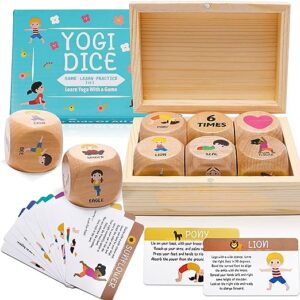

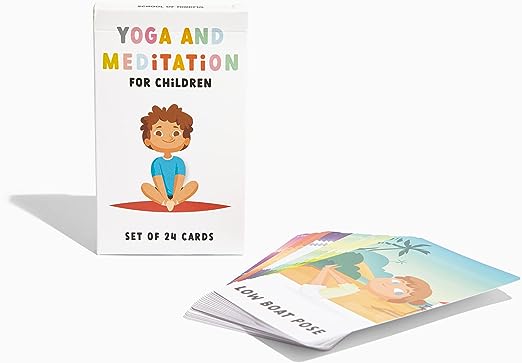
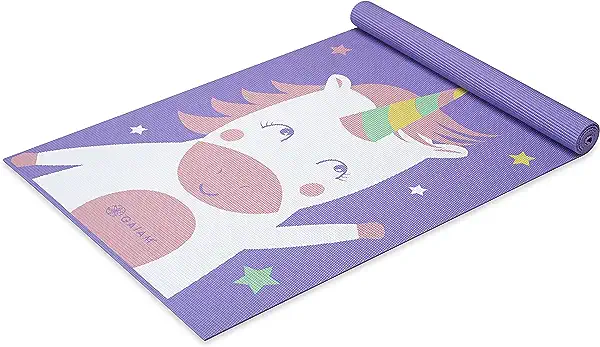

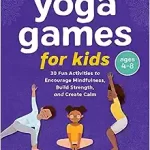
Yoga is not just a practice for adults—it is an essential tool for children’s development. Yoga is a powerful tool that can help both children and families navigate the ups and downs or child development. From improved focus and concentration to enhanced cognitive skills and body awareness, yoga offers a holistic approach to nurturing children’s growth.
It also boosts their self-esteem and confidence, while promoting emotional regulation. By incorporating yoga into your child’s life, you are taking a significant step towards enhancing their overall well-being. So why not introduce them to the wonderful world of yoga today? Let your child embark on this transformative journey—it’s a gift that will last a lifetime.
